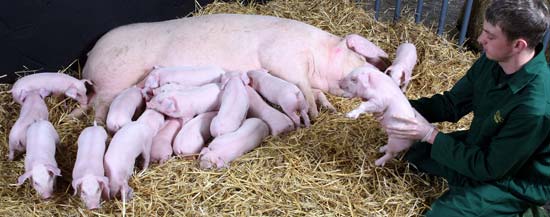 Rapid progress in sow productivity in commercial pig herds is still possible, according to Yorkshire-based pig-breeding company ACMC.
Rapid progress in sow productivity in commercial pig herds is still possible, according to Yorkshire-based pig-breeding company ACMC.On their stand (No 85) at the British Pig & Poultry Fair (Stoneleigh Park, Warwickshire, Tuesday 11 and Wednesday 12 May) the company will be explaining how pig producers can benefit from continuing advances using applied genetics.
Central to this is the use of the Meidam female, a purebred developed exclusively by the company from the hyper-prolific Chinese Meishan breed.

ACMC’s Meidam sow and litter. Not only do these animals have large litters – they can rear them, too, says the company.
“The Meidam gives a 30 per cent improvement in numbers born alive, due to the higher heritability of this trait in the breed, due to the inclusion of the Chinese genes, compared with conventional breeds such as the Large White or Landrace,” said Ed Sutcliffe, ACMC’s technical director. “Normal heritability for this trait is 10 per cent, but in this breed it is 13 per cent, so we can progress 30 per cent faster.” On the farm, this improvement is worth one pig per litter.
A practical example of the influence of this breed has been demonstrated on a 520-sow breeder-finisher unit in Lincolnshire. Since incorporating Meidam genes the number of pigs reared per first-litter gilt in the proportion of the herd containing those genes has averaged 29.9 per year. Second-parity gilts have averaged 29.9 pigs reared per year. This compares with 26.3 per sow per annum for the rest of the herd. The increase of nearly three-and-a-half pigs per sow per year would be worth £252 (margin over feed), per sow annually, equivalent to £131,040 for the whole herd.
To safeguard herd health, many farmers carry out on-farm gilt multiplication. Traditionally, the drawback to this system has been the drop in productivity due to the use of purebreds and the fact that these animals are less hardy than hybrids. However, ACMC has found that due to its placid nature and good temperament the Meidam thrives, even under ‘robust’ group housing systems.
“The Meidam is hardy, seems to suffer less stress than other breeds and is a fantastic mother, so is perfect for this system of producing F1 hybrids,” said Matthew Curtis, ACMC’s managing director. “It is now being used in multiplication systems in 12 countries around the world under a variety of conditions.
www.acmc.co.uk



